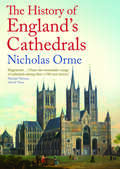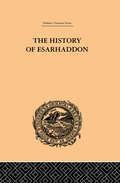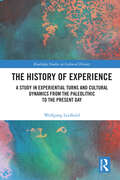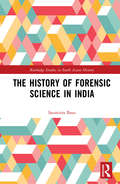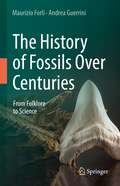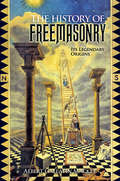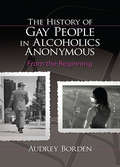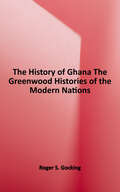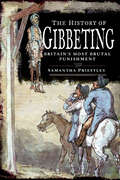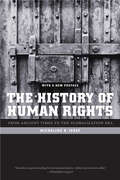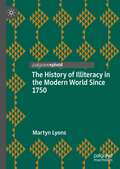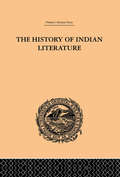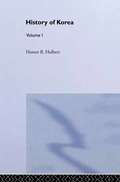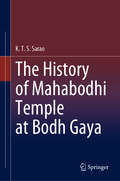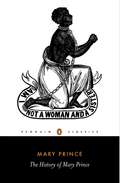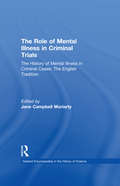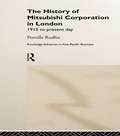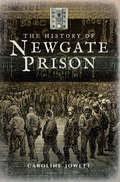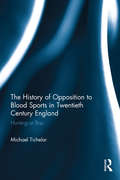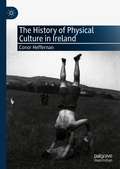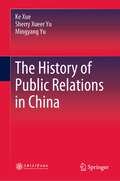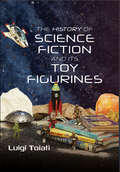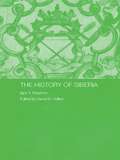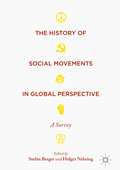- Table View
- List View
The History of England's Cathedrals
by Nicholas OrmeThe first history of all the English cathedrals, from Birmingham and Bury St Edmunds to Worcester and York Minster England&’s sixty-two Anglican and Catholic cathedrals are some of our most iconic buildings, attracting millions of worshippers and visitors every year. Yet although much has been written about their architecture, there is no complete history of their life and activities. This is the first such book to provide one, stretching from Roman times to the present day. The History of England&’s Cathedrals explains where and why they were founded, who staffed them, and how their structures evolved. It describes their worship and how this changed over the centuries, their schools and libraries, and their links with the outside world. The history of these astonishing buildings is the history of England. Reading this book will bring you face to face with the Anglo-Saxons, Vikings, Normans, Reformation, Civil War, Victorian England, World War Two, and finally modern democracy.
The History of Esarhaddon: Budge |f Ernest A. (Trubner's Oriental Ser.)
by Ernest A BudgeFirst Published in 2000. Routledge is an imprint of Taylor & Francis, an informa company.
The History of Experience: A Study in Experiential Turns and Cultural Dynamics from the Paleolithic to the Present Day (Routledge Studies in Cultural History)
by Wolfgang LeidholdIn a wide arc from the Paleolithic to the present day, this book explores the changing structure of human experience and its impact on the dynamics of cultures, civilizations and political ideas. The main thesis is a paradigm shift: the structure of human experience is not a universal constant, but changes over time. Looking at the entire range of human history, there are a total of nine transformations, beginning with conscious perception and imagination in the Paleolithic and ending, for the time being, in modern times with the discovery of the unconscious. In between, this book explores six more transformations that took place in different regions and at different times, which include a sense of order, self-reflection, the eye of reason, spiritual experience, as well as the experience of creativity and of consciousness. As such, The History of Experience presents both a cross-cultural and comparative theory of experience and cultural dynamics, and an exploration of rich materials from East and West. This book is of great use to upper-level undergraduates, postgraduates, and scholars interested in the relationship between history, human experience, culture, and political order.
The History of Forensic Science in India (Routledge Studies in South Asian History)
by Saumitra BasuThis book explores the interaction between science and society and the development of forensic science as well as the historical roots of crime detection in colonial India. Covering a period from the mid-19th to mid-20th century, the author examines how British colonial rulers changed the perception of crime which prevailed in the colonial states and introduced forensic science as a measure of criminal identification in the Indian subcontinent. The book traces the historical background of the development and use of forensic science in civil and criminal investigation during the colonial period, and explores the extent to which forensic science has proven useful in investigation and trials. Connecting the historical beginning of forensic science with its socio historical context and diversity of scientific application for crime detection, this book sheds new light on the history of forensic science in colonial India. Using an interdisciplinary approach incorporating science and technology studies and history of crime detection, the book will be of interest to researchers in the fields of forensic science, criminology, science and technology studies, law, South Asian history and colonial history.
The History of Forgetting: Los Angeles and the Erasure of Memory
by Norman M. KleinIn this extraordinary and original work, Norman Klein examines the process of memory erasure in LA.
The History of Fossils Over Centuries: From Folklore to Science
by Andrea Guerrini Maurizio ForliThis book discusses the history of invertebrate fossil understanding and classification by exploring fossil studies between the 15th and 18th centuries. Before the modern age, the understanding of fossil findings went through several phases. The treatment by philologists, philosophers and historians of natural sciences involved religious, sometimes folkloristic, aspects before scientific ones. This work showcases and assesses these original findings by carrying out a bibliographical, and above all iconographical research, aimed at finding the first printed images of the objects that we now know as fossils. From here, the authors provide an understanding of the true nature of fossils by analyzing them through modern academic viewpoints, and describing each fossil group from a paleontological and taxonomic point of view, retracing their treatment in the course of the centuries.As a point of reference for each fossil group treated, the authors have considered indispensable the use of ancient prints as evidence of the first iconographic sources dedicated to fossils, starting from those in the late fifteenth century, dedicated to the most common groups of invertebrates without neglecting a necessary exception, the ichthyodontolites, fundamental in the discussion in Italy on the interpretation of the organic origin of fossils, and from the end of the sixteenth century to about half of the eighteenth century. The abundant iconographic apparatus used, often unpublished or specially reworked, is essential and functional to the understanding of the various aspects addressed, a visual complement to the text and vice versa, designed and used taking its cue from the need imposed on early scholars to document their discoveries visually. Among the chosen images there is no shortage of original attributions to fossil finds that have been poorly understood or misidentified until now.The English translation of this book from its Italian original manuscript was done with the help of artificial intelligence (machine translation by the service provider DeepL.com). A subsequent human revision of the content was done by the authors.
The History of Freemasonry: Its Legendary Origins
by Albert Gallatin MackeyAn air of profound mystery surrounds the fraternal order of Free and Accepted Masons, or Freemasons. Built on three pillars of brotherly love, charity, and truth, the order ranks among the world's oldest and most renowned societies. This classic study explores Freemasonry's history and traditions, both legendary and documented, and chronicles the society's influence on the Western world, particularly in regard to American culture and government. Author Albert Gallatin Mackey, a renowned historian of the society who held many high positions in the order, traces the rise of Freemasonry from its roots in the ages of Biblical patriarchs and ancient Rome to the eighteenth-century involvement of the Founding Fathers of the United States. He also explores the associations of the Freemasons with the Knights Templars of the Crusades, the Druids, the Rosicrucians, and a secret Muslim sect known as the Assassins. In addition, he discusses the significance of the Stone of Philosophers, Euclidean geometry, and a variety of forms of architecture. This complete survey of the mythical and allegorical narrative of Freemasonry offers novices and experts alike a revealing look at the society's philosophical and ritual foundations.
The History of Gay People in Alcoholics Anonymous: From the Beginning
by Audrey BordenThe History of Gay People in Alcoholics Anonymous documents and honors the ways thousands of LGBT people have carried Alcoholics Anonymous' message. This illuminating chronicle includes interviews and documents that detail the compelling history, recovery, and wisdom of gay people in AA. The book examines the challenges AA faced as the fellowship endeavored to become a more inclusive and cohesive community. The first-person accounts narrate the important work of influential gay and straight AA members that led key events in AA’s history. The author includes material on the steps and traditions of AA, and on becoming an ally to LGBT people on the road to recovery.Topics in The History of Gay People in Alcoholics Anonymous include: the gay origins of AA’s Third Tradition a comparison of treatments for alcoholism and homosexuality compelling portraits of sober gay life in the 1950s and 1960s the debate in AA over meetings for gay alcoholics interviews with members and co-founders of the first gay AA meetings the history of the first gay AA/Al-Anon conference interviews with pioneering gay addiction professionals the history of AA pamphlet “AA and the Gay/Lesbian Alcoholic” Alcoholics Together, and why a parallel AA organization for gay alcoholics formed in southern California strategies AA’s gay members developed to make their meetings simultaneously safe and public—and why some of them are still necessary today much more The History of Gay People in Alcoholics Anonymous is an enlightening book for members of the LGBT and heterosexual recovering community, alcoholism and addiction professionals, as well as physicians, counselors, psychiatrists, psychologists, social workers, clergy, historians, sociologists, educators, students, and anyone interested in learning more about AA or this aspect of the community’s history.
The History of Ghana: Greenwood Histories of the Modern Nations
by Roger S. GockingGocking provides a historical overview of Ghana from the emergence of precolonial states through increasing contact with Europeans that led to the establishment of formal colonial rule by Great Britain at the end of the 19th century. Colonial rule transformed what was known as the Gold Coast economically, socially, and politically, but it contained the seeds of its own demise. After World War II an increasingly more effective nationalist movement challenged British rule, and in 1957 Ghana became independent. Independence brought its own challenges the most important of which was the inability to maintain political stability. Within the space of 24 years there were four military coups and the collapse of three republics. Ghana's Fourth Republic, established in 1993, has dealt with the legacy of instability inherited from the past as it moves towards a more stable future. A timeline, photographs, maps, and an appendix of biographies of notable figures in the history of Ghana are included. Students and adults alike will find this book to be highly effective in describing this country's often turbulent and tumultuous history.
The History of Gibbeting: Britain's Most Brutal Punishment
by Samantha PriestleyAn eye-opening guide to the public execution practice of hanging criminals in body-shaped cages as a crime deterrent or religious punishment. The history of gibbeting is the story of one of Britain’s most brutal forms of punishments, the hanging of criminals in a body shaped metal cage as a warning and as a form of justice. From the folklore of live gibbetings to the eerie historical documenting of this weird post-execution tradition, The History of Gibbeting examines how and why we dealt with murderers and other serious criminals in this way. The book uses case studies through history and takes a look at how the introduction of the Murder Act shaped our relationship with gibbeting for years to come, and how we as a society demanded the most shocking post-mortem treatment of criminals. Whether gibbeting was ever a successful deterrent, it is still a fascination today and gibbet cages remain on display in museums all over the country.“I have to say that I was not aware that gibbeting involved metal cages, nor how society clamored for post-mortems on gibbeted victims. Absolutely fascinating, but not for the faint-hearted!” —Books Monthly
The History of Human Rights
by Micheline IshayMicheline Ishay recounts the dramatic struggle for human rights across the ages in a book that brilliantly synthesizes historical and intellectual developments from the Mesopotamian Codes of Hammurabi to today's era of globalization. As she chronicles the clash of social movements, ideas, and armies that have played a part in this struggle, Ishay illustrates how the history of human rights has evolved from one era to the next through texts, cultural traditions, and creative expression. Writing with verve and extraordinary range, she develops a framework for understanding contemporary issues from the debate over globalization to the intervention in Kosovo to the climate for human rights after September 11, 2001. The only comprehensive history of human rights available, the book will be essential reading for anyone concerned with humankind's quest for justice and dignity. Ishay structures her chapters around six core questions that have shaped human rights debate and scholarship: What are the origins of human rights? Why did the European vision of human rights triumph over those of other civilizations? Has socialism made a lasting contribution to the legacy of human rights? Are human rights universal or culturally bound? Must human rights be sacrificed to the demands of national security? Is globalization eroding or advancing human rights? As she explores these questions, Ishay also incorporates notable documents--writings, speeches, and political statements--from activists, writers, and thinkers throughout history.
The History of Illiteracy in the Modern World Since 1750
by Martyn LyonsThis Palgrave Pivot examines the history of literacy with illiterate and semi-literate people in mind, and questions the clear division between literacy and illiteracy which has often been assumed by social and economic historians. Instead, it turns the spotlight on all those in-between, the millions who had some literacy skills, but for whom reading and writing posed difficulties. Its main focus is on those we have often labelled ‘illiterates’, rather than those who enjoyed full competence in reading and writing in modern society. In offering a historical perspective on the ‘problem’ of illiteracy in the modern world, it also questions some enduring myths surrounding the phenomenon. This book therefore has a revisionist objective: it intends to challenge conventional wisdom about illiteracy.
The History of Indian Literature
by Albrecht WeberFirst Published in 2000. This title is Volume 10 in the 14-volume series titled India: Language and Literature, one of the Trüber's Oriental Series. The lectures in this volume were presented to the narrow circle fellows in this field of study. This publication will now reach the wider circle of those interested and those researchers of the history of literature generally. The form in which these lectures appear is essentially the same in which they were delivered while incidental remarks are given as footnotes and new matter has been added.
The History of Korea
by H. B. HulbertWith a modern introduction by Clarence Weems, originally published in Seoul in 1905 to wide acclaim as the only authentic history of Korea from prehistory to the Twentieth Century, this two volume work remains required reading for students of Western historiography of Korea.
The History of Mahabodhi Temple at Bodh Gaya
by K.T.S. SaraoThis book offers an overview of the emergence of Bodh Gayā as a sacred site within Gayā Dharmakṣetra. It contextualizes the different encounters, incidents, and legends connected to the Buddha’s experiences shortly before and after he attained Bodhi – when, spiritually speaking, he was extremely lonely and was trying to carve a place for himself in the highly competitive Gayā Dharmakṣetra. Further, the book examines the role of various personalities and institutions contributed towards the emergence of Mahābodhi Temple. It incorporates a wealth of research on the role of the Victorian Indologists as well as the colonial administrators, the Giri mahants, and Anagārika Dharmapāla, to understand the material milieu pertaining not only to its identity but also access to spiritual resources as its conservation and development. This book is an indispensable read for students and scholars of history, cultural studies, and art and architecture as well as practitioners of Buddhism and Hinduism.
The History of Mary Prince: A West Indian Slave
by Mary PrinceThe History of Mary Prince (1831) was the first narrative of a black woman to be published in Britain. It describes Prince's sufferings as a slave in Bermuda, Turks Island and Antigua, and her eventual arrival in London with her brutal owner Mr Wood in 1828. Prince escaped from him and sought assistance from the Anti-Slavery Society, where she dictated her remarkable story to Susanna Strickland (later Moodie). A moving and graphic document, The History drew attention to the continuation of slavery in the Caribbean, despite an 1807 Act of Parliament officially ending the slave trade. It inspired two libel actions and ran into three editions in the year of its publication. This powerful rallying cry for emancipation remains an extraordinary testament to Prince's ill-treatment, suffering and survival.
The History of Mental Illness in Criminal Cases: The Role of Mental Illness in Criminal Trials (Garland Encyclopedias in the History of Science)
by Jane Campbell MoriartyFirst Published in 2002. Routledge is an imprint of Taylor & Francis, an informa company.
The History of Mitsubishi Corporation in London: 1915 to Present Day (Routledge Advances in Asia-Pacific Business)
by Pernille RudlinThe History of Mitsubishi Corporation in London examines the culture clashes, the friendships and the changing businesses that Mitsubishi Corporation's London branch oversaw in the eighty-five years following its foundation. It examines the paradox of how Mitsubishi Corporation could operate internationally for nearly a century, and still remain resolutely Japanese. With the slowdown in Japanese economic growth however, this book asks whether the corporation needs to change its mission, as well as controversially questioning whether information technology is in fact a barrier to, rather than a driving force for, successful globalization. As a long-term employee of Mitsubishi both in Tokyo and London, Pernille Rudlin has a unique perspective on the world of Japanese corporate culture in Britain. No other corporate history has examined a Japanese subsidiary in such detail, including interviews with more than thirty employees past and present.
The History of Newgate Prison
by Caroline JowettA history of the iconic London prison, featuring insights on daily life, the evolution of prison systems, and famous inmates.As the place where prisoners, male and female, awaited trial, execution, or transportation Newgate was Britain’s most feared gaol for over 700 years. It probably best known today from the novels of Charles Dickens including Barnaby Rudge and Great Expectations.But there is much is more to Newgate than nineteenth century notoriety. In the seventeenth century it saw the exploits of legendary escaper and thief Jack Sheppard. Among its most famous inmates were author Daniel Defoe who was imprisoned there for seditious libel, playwright Ben Jonson for murder, and the Captain Kidd for piracy.This book takes you from the gaol’s 12th century beginnings to its final closure in 1904 and looks at daily life, developments in the treatment of prisoners from the use of torture to penal reform as well as major events in its history.Praise for The History of Newgate Prison“An amazing, entertaining and informative book!” —Books Monthly“This is a highly readable and accessible account, not only of the iconic institution, but also of the history of crime and punishment. It is packed full of evocative detail and is essential reading for all those interested in crime history.” —Who Do You Think You Are? magazine
The History of Opposition to Blood Sports in Twentieth Century England: Hunting at Bay
by Michael TichelarAn interdisciplinary social history, this book examines the major pressures and influences that brought about the remarkable growth of opposition to hunting in twentieth century England. With public opinion consistently deciding from the middle of the century onward that hunting mammals for sport was cruel and unacceptable, it would appear that the controversy over hunting has all but been decided, though hunting yet remains ‘at bay’. Based on a range of cultural, social, literary and political sources drawn from a variety of academic disciplines, including history, sociology, geography, psychology and anthropology, The History of Opposition to Blood Sports in Twentieth Century England accounts for the change in our relationship with animals that occurred in the course of the twentieth century, shedding light on the manner in which this resulted in the growth in opposition to hunting and other blood sports. With evidence comprising a mixture of primary and secondary historical sources, together with documentary films, opinion polls, Mass Observation records, political party archives, and the findings of sociologists, political scientists, anthropologists and geographers, this book will appeal to scholars and students across the social sciences and historians with an interest in human–animal relations.
The History of Physical Culture in Ireland
by Conor HeffernanThis book is the first to deal with physical culture in an Irish context, covering educational, martial and recreational histories. Deemed by many to be a precursor to the modern interest in health and gym cultures, physical culture was a late nineteenth and early twentieth century interest in personal health which spanned national and transnational histories. It encompassed gymnasiums, homes, classrooms, depots and military barracks. Prior to this work, physical culture’s emergence in Ireland has not received thorough academic attention. Addressing issues of gender, childhood, nationalism, and commerce, this book is unique within an Irish context in studying an Irish manifestation of a global phenomenon. Tracing four decades of Irish history, the work also examines the influence of foreign fitness entrepreneurs in Ireland and contrasts them with their Irish counterparts.
The History of Public Relations in China
by Ke Xue Mingyang Yu Sherry Xueer YuThis book is the first on the history of Chinese public relations, and has been selected as one of the “40 representative books for 40 years of public relations in China” by the Public Relations Society of China. In four chapters, it systematically reviews and analyzes the trajectory and evolution of public relations in China from the very start – when the “reform and opening” policy was adopted in 1978 – to the present.The book will help both established and new scholars and practitioners in the field to understand the changing nature of public relations in China. It offers a unique perspective by placing the discussion of the development of public relations in the general context of the changes and development of China as a whole, and in relation to the changing status of public relations around the world. Accordingly, readers will not only gain a more in-depth understanding of the history of the field, but also of the political, economic, societal, cultural and scientific development of China in modern times.
The History of Science Fiction and Its Toy Figurines
by Luigi Toiati"This eye-opening book deserves a spot on the bookshelves of anyone who not only enjoys collecting, but also has a great interest in all facets of the history of our hobby." — Toy Soldier Collector Science fiction, as the name suggests, is the combination of science and fantasy. In addition to a literary form, it also encompasses film, TV, comics, toys and our beloved toy astronauts, or other figures such as aliens, monsters and other playable genres. The term science fiction was coined by publisher Hugo Gernsbach around the first decades of the last century to refer to the predominantly 'space' adventures covered in his magazines. Space invaded radio, cinema, TV, and consequently for a long time toy figurines were predominantly space-related, later evolving into other themes. This lavishly illustrated book covers both the history of literary science fiction, following in the footsteps of contemporary official criticism, and toy figurines inspired by science fiction. You will also find several other themes, such as the link between science fiction figures and cinema, radio, TV, comics, and more. Luigi Toiati offers to both guide the reader on an often-nostalgic walk through science fiction in all its various forms, and to describe the figurines and brands associated with it.
The History of Siberia (Routledge Studies in the History of Russia and Eastern Europe)
by Igor V. NaumovSiberia has had an interesting history, quite distinct from that of Russia. Absolutely vast, containing many non-Russian nationalities, and increasingly important at present because of its huge energy reserves, Siberia was at one time part of the Mongol Empire, was settled relatively late by the Russians, and was for a long period a wild frontier zone, similar to the American West. Providing a comprehensive history of Siberia from the very earliest times to the present, this book covers every period of Siberia's history in an accessible way.
The History of Social Movements in Global Perspective
by Stefan Berger Holger NehringSocial movements have shaped and are shaping modern societies around the globe; this is evident when we look at examples such as the Arab Spring, Spain's Indignados and the wider Occupy movement. In this volume, experts analyse the 'classic' and new social movements from a uniquely global perspective and offer insights in current theoretical discussions on social mobilisation. Chapters are devoted both to the study of continental developments of social movements going back to the nineteenth century and ranging to the present day, and to an emphasis on the transnational dimension of these movements. Interdisciplinary and truly international, this book is an essential text on social movements for historians, political scientists, sociologists, philosophers and social scientists.
